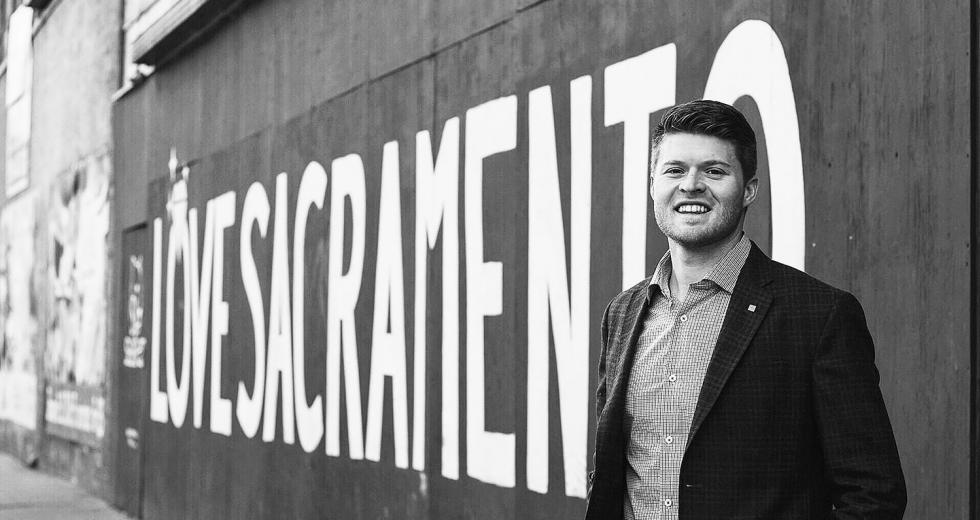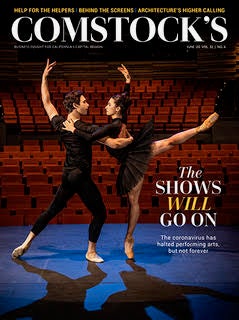Cameron Law is the executive director of The Carlsen Center for Innovation & Entrepreneurship at Sacramento State. Before joining the center in October 2019, Law spent two years as executive director of Social Venture Partners in Sacramento, which connects corporate donors with nonprofits. Comstock’s spoke with Law about the ways both the center and the local entrepreneurial scene are evolving in the face of a crisis.
How does the Carlsen Center help create innovation and entrepreneurship in the region?
Our mission is to make innovation and entrepreneurship pervasive throughout the greater Sacramento region, and our vision is to be the hub of innovation and entrepreneurship. …
We’ve broken down our activities into three main categories, which we call Discover, Build and Launch. Discover is, at an early stage, providing access and accessibility to the entrepreneurial journey. These programs (include) Global Entrepreneurship Week, which we just received a $1 million funding in November (from Western Health Advantage) to endow … from here on out. (The program) is a full week of events, meaning conversations around what entrepreneurship looks like to different disciplines, as well as elevating the conversation of what’s taking place in terms of innovation and entrepreneurship.
We held a state of the union (in) which we talked about what does the funding landscape look like for early stage entrepreneurs. We brought in (City of Sacramento’s Chief Innovation Officer) Louis Stewart to talk about the Sacramento Urban Technology Lab and the role the city’s playing, as well as (Chief Grid Strategy and Operations Officer) Paul Lau from SMUD to talk about the California Mobility Center. And so (we’re) really trying to elevate what’s going on and how people can plug into this growing ecosystem that we have.
Another type of program that we have is the entrepreneurship speaker series. We partnered with one of our advisory board members, (HaneyBiz CEO) Mark Haney, who’s very active in the entrepreneurial ecosystem, and we’re bringing in people to talk about their entrepreneurial journey and what successes they’ve seen, as well as what challenges and failures they’ve seen and how they overcame them.
And this is really to empower students to see themselves in this space, as well as to provide a resource for budding entrepreneurs to learn about how they can grow and scale their companies. … We (also) work across colleges on campus to provide a pitch competition … creating a creative outlet to explore (students’) ideas as well as map those ideas onto a business model.
And then we have our (Build category) programs, which have been a little bit disrupted by COVID-19. We have a Lean Startup Bootcamp, which is a two-day crash course around basically the Lean Startup methodology … (and) ultimately results in individuals coming out of it with a clearer picture of what their business idea is, as well as that they can start to tell their stories, whether that’s to customers or to investors. It really helps them map that idea out at an early stage.
We have a Venture School program which is a seven-week-long program where we take a cohort of entrepreneurs through programming to help them to achieve these milestones in their business. And then we were going to do an in-person entrepreneurship Toolkit Series, which is a five-week series, and we’ve had to adapt that to a virtual setting here due to COVID-19.
How would you describe Sacramento’s startup scene — what are our attributes and what are we lacking?
I think we’re definitely growing. I think there’s this buzz about our entrepreneurial ecosystem, and we’re at this inflection point, I feel, of really taking this tremendous stride for our region. So I have a lot of optimism. Obviously, there’s some current challenges that we’re just seeing in terms of what that means for our region. …
I think there’s definitely growth in technology. I think there’s going to be a coming wave of all these mobility types of companies. But I think one area that’s not always spoken to is the restaurant and bar scene. I think we see a lot of entrepreneurship occurring in that space as well. And so let’s recognize entrepreneurship is not just technology companies. … We have Main Street businesses opening up and building the culture of our city and region for the better as well.
How does the Carlsen Center fit into that scene?
I think one thing about how we fit into it is trying to be a presenter of different resources … not trying to reinvent the wheel of things that already exist. During Global Entrepreneurship Week in November, we brought together stakeholders from UC Davis, (University of the Pacific), William Jessup (University) and the community colleges to lead a conversation of how we can really work together as a university, as an education institution, to advance our regional culture around innovation and entrepreneurship. … The key thing is that our programs are open to all students in the region. …
Another thing we bring is mentorship. The Carlsen Center’s advisory board is (made up of) business leaders as well as key ecosystem leaders. … One of the things I see as a strong suit of our ecosystem is (that) there (are) a number of support systems for the early stage entrepreneurs in terms of events and mentorship and programming. I think where we want to continue to grow is always around the funding piece for those entrepreneurs. … The more we continue to build successful early stage companies, the more we’ll attract capital and start to create a space for that to happen.
What have you been focusing on since you started in October, and what are your main initiatives for the coming year?
One of my main goals was bringing connections from the community into the Carlsen Center and providing that access to students. There are resources that exist on campus which are tremendous, but what I recognized was … the university’s ties are much larger to the community. … So that’s bringing in real-life experience from current entrepreneurs, or people that have already done that, as well as connections to potential investors. (We’re) trying to bring in people from the community and organizations that the university typically hasn’t had touch points with … and helping elevate the opportunities and access … that provides.
This year, our goal was to double the footprint of students (who) we are serving on campus. We’re actively wanting to formalize our partnership with the different universities and see how we can have an active dialogue about how we actively work together and promote our region as the place for innovation and entrepreneurship, where we can attract talent and grow companies together. … Our three areas that we’re looking to build out specific tracks or programming for (are) the Latinx population, veterans and women in technology.
What kinds of entrepreneurs have been involved in your programs?
What I really love about our program is that it is very diverse in all aspects. … We have people coming in that want to start nonprofits that are solving social challenges, people that are looking to start technology companies, everything from fintech to the next application. … One of our students, who’s a freshman … wants to create a fintech solution that helps solve college savings challenges. He just got accepted into the (UC Davis Big Bang Business Competition).
In our Startup Weekend, we also have some students who are trying to create a peer-to-peer platform for campus services, and they’re applying to go through our next program, which is a mastermind cohort. (Other students) are trying to start an auxiliary dwelling-unit type of thing. … Their vision is: How do we start to tackle homelessness through alternative housing?
How have your programs shifted since the campus closed?
It’s going well. … We have a fairly nimble team. We have two entrepreneurs in residence who help run our programming, and they’ve been actively switching all of our curriculum to online learning. … We were able to actually create a whole new program which we’re calling a virtual mastermind cohort. … It’s going to be a peer-to-peer facilitation, basically helping them solve key goals in their business, and then we’re bringing in subject-matter experts and mentors.
I think one of the things that this pandemic has really turned out in terms of an opportunity is it’s forced us to think differently about our programming. What we’ve seen is that, through the virtual setting, we’re able to reach more people, because there’s not the physical constraint of someone having to drive to the Carlsen Center or be physically present. We’re able really to reach out to the community, expand our reach. … What’s really great is we’re getting applications for the student cohort from all the way up in Yuba County to Davis to American River College to Sac State students. So we’re getting a wealth of applications, which is really great, and it’s spreading in our region, which is ultimately our goal … to serve people throughout the greater Sacramento region.
What role do you think the center could play in the recovery from the coronavirus pandemic?
In the Great Recession, one of the challenges Sacramento saw was our reliance on being a government town. That was hugely challenging when you didn’t have the economic drivers to truly get us back up and going. … One thing that was shown through the Brookings (Institution’s) report is the need to diversify our economy and start to build out our entrepreneurial sector further. And that’s a key pillar of what we want to do moving forward.
What is the center doing to ensure we also have the trained workforce to support our innovation efforts?
A lot of that is just the location of being at the university. … Sixty-five percent of students (who) graduate from Sac State … live and work in this region. … Not all of them are going to become entrepreneurs, but if all of them start to have a touch point with the Carlsen Center where they’re learning entrepreneurial and innovation tools and starting to think entrepreneurially, they’ll take that to wherever they work, whether that’s for a larger (corporation) in our region or our state. … They’ll start to have these tools and these mindsets that ultimately grow our region as they recognize the role entrepreneurs are trying to play.
–
Stay up to date on business in the Capital Region: Subscribe to the Comstock’s newsletter today!
Recommended For You
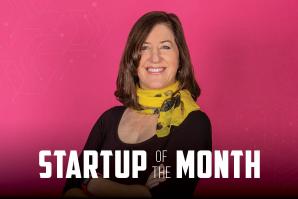
Startup of the Month: Humaxa
A new model for employee-satisfaction surveys
Humaxa uses artificial intelligence and natural language processing to help employers boost productivity and satisfaction among their workforce.
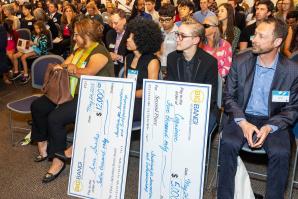
We Can’t Stop Improving Our Innovation Ecosystem
It may seem like it snuck up on us, but the Capital Region has a healthy startup ecosystem that has been growing for over 25 years, starting with the establishment of the Intel and Hewlett-Packard campuses in the early 1980s. There have been many milestones along the way and we expect many more to come. We are definitely on the map as a city where you can build a startup.

An Entrepreneur Needs to Ask These Five Questions
Resilience and risk are must-have traits to secure support for your entrepreneurial vision.
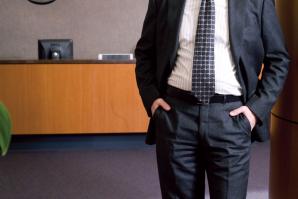
Grow Home
Big business settles down in south Placer
South Placer County has long been considered a good place to settle down and raise a family. Likewise, some companies are finding it to be a great place to settle down and raise a business.



